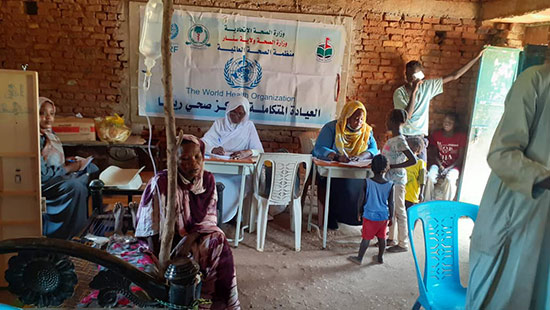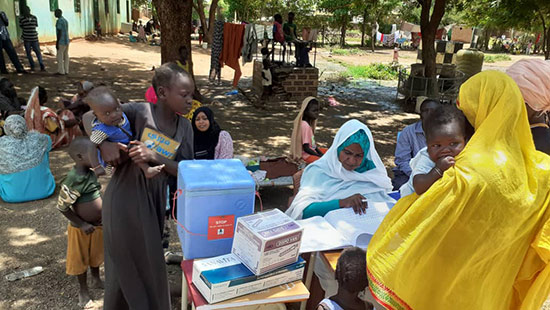21 November 2023 – The conflict that has escalated in Sudan since 15 April 2023 has plunged the country into an unprecedented health crisis. Over 70% of hospitals in conflict-affected states are nonfunctional or only partially operational, and those facilities that are functional are overwhelmed.
To meet the growing demand for health services, WHO and the state ministries of health of 8 states launched 21 mobile clinics in August 2023. These provide primary health care to displaced people and host communities in areas where health facilities are nonfunctional or inaccessible. The mobile clinics work close to sites that host internally displaced people, operating out of available structures such as schools, health bureaus, and clinics that had previously been closed, and even in the shade of trees.
 Patients with various ailments receive treatment and medication free of charge at a WHO-supported mobile clinic in Sudan. Photo credit: WHO/WHO Sudan
Patients with various ailments receive treatment and medication free of charge at a WHO-supported mobile clinic in Sudan. Photo credit: WHO/WHO Sudan
Over 48 900 patients have been treated at the mobile clinics since their launch. The mobile clinics provide services that range from diagnosis and treatment of common illnesses, minor surgery, and follow-up for chronic diseases to maternal and child health, including antenatal care and childhood vaccination. They also offer first-line support to survivors of gender-based violence, as well as mental health support and referrals, including via ambulance services. All these services and any required medications are provided free of charge.
Patients with diabetes and hypertension who had discontinued their follow-up care have been able to resume treatment. Pregnant mothers with complications have received the care they need or been referred for specialized services. Patients with life-threatening conditions have been treated in time, averting death, and survivors of gender-based violence have received life-saving treatment and counselling.
The mobile clinics also serve as sentinel sites for disease surveillance, helping to detect, report and respond to outbreak-prone diseases like cholera, dengue and malaria. The first suspected cholera case from Khartoum state was identified by the WHO-supported mobile clinic operating in Khartoum.
Often, these mobile clinics are the only health care units available to people trapped in active conflict states or displaced to areas with no health facility. The WHO-supported mobile clinic in Khartoum treats 521 patients a day and has been a critical point of care for cholera patients. Patients with signs and symptoms of cholera receive emergency care at the mobile clinic, and those in need of inpatient treatment are referred to cholera treatment centres.
State ministries of health provide equipment and staff for the mobile clinics. WHO provides medical and laboratory supplies, as well as on-site expert advice, and covers the operational costs, including fuel for generators and incentives for health workers.
 A WHO-supported mobile clinic operates in the shade of a tree. Mobile clinics operate in any available space to address the health needs of Sudan’s people. Photo credit: WHO/WHO Sudan
A WHO-supported mobile clinic operates in the shade of a tree. Mobile clinics operate in any available space to address the health needs of Sudan’s people. Photo credit: WHO/WHO Sudan
WHO has been able to run these mobile clinics thanks to the generous support of the United Nations Central Emergency Response Fund and Germany.


